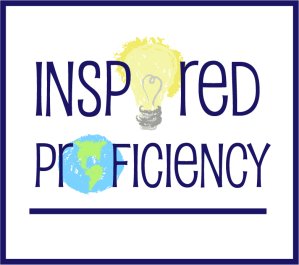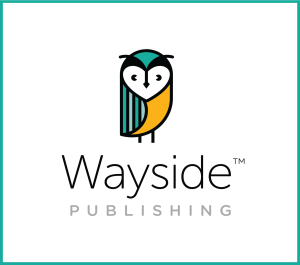Welcome to Inspired Proficiency and thank you for joining us for season 4, episode 6. As always, please tweet any takeaways and inspirations to #inspiredproficiency. Don’t forget that Ashley and her podcasts are also on Facebook in the group “Inspired Proficiency Teacher Collaboration” with lots of great ideas for the classroom.
Download the episode here or listen and subscribe on Apple Podcasts here or find it wherever you listen to podcasts!

Our presenting sponsor Wayside Publishing invites you to nominate a world language teacher you know who is making a difference proficiency-driven practices! Nominate them on their website so they can be a featured educator on the blog.
Ashley is excited to head to Massachusetts State Foreign Language Conference towards the end of October. She loves to connect with fans so if you see her, say hello, Tweet her, connect with her! She is presenting a 4 hour workshop about Playful Proficiency and a regular session about Digital Student Portfolios. Ashley will also be presenting at the ACTFL conference this year. One session touches upon work/life balance and the other she is co-presenting with a colleague about passions and play within the classroom. Also, stop by the Wayside Publishing booth to play the Inspired Proficiency Game Show called “Proficiency Pyramid.”
Today’s episode is the third episode this season about assessment where we discuss with Dr. Mouna Mana. Our second episode this season looked at big picture assessments with Rhonda Higgins. We also had an assessment panel on episode four. Today we’re excited to learn even more about assessment from Dr. Mana.
Interview:
 Dr. Mana is very excited to share information with us today on the show. She has her PHD in language and literacy with a strong focus on formative assessment and how it helps in the language classroom. She has taught Arabic at the university level and trained Arabic teachers.
Dr. Mana is very excited to share information with us today on the show. She has her PHD in language and literacy with a strong focus on formative assessment and how it helps in the language classroom. She has taught Arabic at the university level and trained Arabic teachers.
What do we mean by formative assessment?
- Assessment for learning
- Dylan William and Paul Black say
- Any and all assessment that provides information to be used as feedback that could somehow modify the teaching and learning
- Think of it not as a noun but as an adverb
- Assess formatively
- Should be embedded in our everyday activities within the classroom
- Does not need to be some special event
- Just be more intentional about collecting this data and information and how will we use it when we collect it intentionally
- Means of focusing on what students are going to be able to do
Students need to reflect on their own learning based on these formative assessments. This type of reflection does not always need to be one within the target language. This reflection can be embedded within regular classroom events and just extended to allow for reflection.
Advice on embedding formative assessments
- Consider carefully how assessing guides instructional choices
- How do these choices involve students in the learning process
- Example
- Create captions for pictures of where Arabic is students
- Repeat this activity 2 or 3 times
- Choose favorite one of the multiple recreations
- Their choice informs the teacher about what they’ve learned and what they’re able to do
- Their choice is also information for the student about why they chose it
- What did you learn?
- What do you still need?
- Why did you pick this one as the best one?
- Why are you confident about this?
- What did this show in your learning journey?
- What to do next?!
- It’s probably already planned but it can be tweaked
- Maybe it’s too hard for the kids and they’re not ready
- What needs to be revisited?
- What practice do they need?
- Dr. Mana likes to use the word information instead of assessment
- Assessment makes teachers think they need to do something extra and different
- Students focus too much on the grade when we call it an assessment
- Information is more useful in informing us with what we need to do to help students succeed
- Can target us and students more to reach proficiency goals
- Can help us be more reflective in our journey
- Assessment makes teachers think they need to do something extra and different
- Information Gathering
- Difficult part of teaching
- When is there time to look at the data?
- Teachers often have to do this “on the go” or don’t have time built in so adjustments are made quickly if at all
- Constantly ask ourselves as teachers
- Susan Brookhart’s book Exploring Formative Assessments has a great chart with questions
- What did I do helped students figure out where they’re going?
- What did I do to show students how close they are to completing their learning goals?
- What did I do to communicate these learning goals to students?
- What tool or process have we set in place to help students with what they need?
- What do they need? What do they need next?
- This question is usually a missing step when thinking about formative assessments
- Instead
- Maybe no homework, sit and reflect about their progress
- Reflect about what they can do next to improve
- Have students drive the classroom instruction by teaching students to self-reflect and help with their own growth
- Coaching?
- Students might not know how to do this at first
- Coaching will be required to help students be self-reflective
- Use rubrics to help students identify something they might need
- Think about a rubric as a way to grow instead of as a grade for performance
- Think of assessment as a discussion with students about progress
- Enacting the World of Language Instruction: High Leverage Teaching Practices by Eileen Glisan and Richard Donato
- Whole section on discussions about progress
- This process becomes more natural and more authentic
- Will probably feel less stressful for students when it’s more about growth instead about grades
- Teach kids it’s more about the learning process than the grade outcome
Shifting Focus
- Not a separate event from teaching
- Ask students to help us figure out what they need
- Gather information
- Do something with that information
- We get caught up with all facets of teaching and revisiting this idea often is a good idea
- Dr. Mana encourages all teachers to better understand assessing formatively
- Reflective journal on experiences with formative assessments
- Sit and think about what you’ve done with the information you have
- How can you use that information better to revise plans and instructional activities?
Tips to shift this focus
- Have students participate and serve as instructional resources
- Not always successful using heritage learners as resources for novice/non heritage learners
- Have students ask each other the reflection questions
- What did you learn today?
- What do you feel like you need?
- 1:1 exit chat instead of exit slip
- What do I need to be able to do X activity?
- What can the teacher contribute to help more?
- Focus on what I can do as a teacher to collect information I need
Game Segment with Sarah Breckley:
- Photo scavenger hunt with a tweak
- Fun!
- Email the staff a day before since students might be around campus without a teacher
- Students in groups, you choose size
- Sarah does this with groups of 3 or 4
- One student in each group with phone and some type of communication app
- Snapchat, facebook, messenger
- Start a live group chat
- Don’t have to use social media if uncomfortable
- Can wait and have kids send all pictures somewhere when complete
- Fun to see it happening all at the same time if you have some sort of way to communicate
- Students take pictures and teacher can see within the conversation where they are and what they’re taking pictures of
- Provides hints to other groups when you can see everyone else’s information and pictures
- Picture hunt list provided to students before scavenger hunt
- Picture of something that reminds you of the story or book we just read
- Picture of something helpful in emergencies
- Picture of where you sit at lunch
- Picture of something that defines your own culture
- Use the pictures
- Picture talk with the class
- What’s happening?
- Where did so and so go?
- Who’s in the pictures?
- What are they doing?
- Prints them and hangs them in fun places at school to remind people how fun Spanish class is (especially if you need to advertise your class if it’s a special or an elective)
- Picture talk with the class
- Go over firm rules and boundaries before students leave the room
- No running
- Don’t interrupt other classes
- Permission to take someone else’s pictures
Resources and links mentioned on the show:
- Quizlet
- Susan Brookhart’s book Exploring Formative Assessments
- Book: Enacting the World of Language Instruction: High Leverage Teaching Practices by Eileen Glisan and Richard Donato
- Episode 2, Season 3 Podcast with Rebecca Blouwolff and her ideas for a Target Language Discourse Community with many ideas from the Glisan Donato book mentioned in today’s podcast
Guests:
- Dr. Mouna Mana on Twitter @ms_mouna
- Sarah Breckley on Twitter @SarahBreckley
Season sponsorship brought to you by:
- Wayside Publishing #followtheowl

Episode sponsors:
